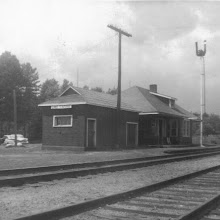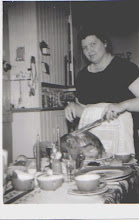87-YEAR OLD BARRY'S BAY WOMAN WRITES BOOK ABOUT LIFE IN ALGONQUIN PARK
 Hot off the press. Gwen Woermke at home in Barry's Bay with a copy of her
Hot off the press. Gwen Woermke at home in Barry's Bay with a copy of her
first book LAKE TRAVERSE STATION: A RAILROAD WIFE'S
ALGONQUIN PARK MEMOIR.
Ever since I married Roy and moved to Lake Traverse Station in 1951, I dreamed about writing a book chronicling my life in Algonquin Park. Today, I am eighty-seven years old, and I am pleased that this dream has finally come true.
In addition to the memories of “an old lady,” this book has some historical information about the Park, the lumber industry, the CNR, Lake Traverse Lodge, Booth's Turtle Club and the National Research Council's Algonquin Radio Observatory which my son has researched and compiled. I have always felt that the northeast side of Algonquin has been overlooked. I hope that this book will remedy that and pay tribute to the people who lived and worked on that side of the Park.
Could a young couple today live in the bush with no running water, no hydro, no washer and dryer, and no television? Could they survive with only a coal stove, coal-oil lamps and a battery radio? I don’t know. It wasn’t easy for Roy and me, but we had no time to feel sorry for ourselves, and we were never lonely. We were quite content to spend our spare time together ̶ fishing or picking berries, playing cards, sharing meals with friends and travellers, and occasionally being called upon to help others. It was a simpler life in a simpler time, and it was very satisfying.
I hope that readers will enjoy my reminiscences (some of my relatives and friends have heard them many times) and appreciate the history in this book.


